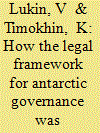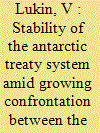|
|
|
Sort Order |
|
|
|
Items / Page
|
|
|
|
|
|
|
| Srl | Item |
| 1 |
ID:
174520


|
|
|
|
|
| Summary/Abstract |
ON DECEMBER 1, 1959, the Antarctic Treaty was signed by Australia, Argentina, Belgium, Great Britain and Northern Ireland, New Zealand, Norway, the Soviet Union, the United States, France, Chile, the Union of South Africa, and Japan. Its founders were the states engaged in scientific research on the sixth continent as part of the 1957-1958 International Geophysical Year (IGY) program. The Antarctic Treaty was the first international legal act to regulate the activities of countries, establish a governance framework and determine the nature of interstate relations in the Southern Polar Region. Drafted at the height of the Cold War, the document became a model for defusing international tension and an example of practical joint effort by states to address global scientific problems. Peace, international cooperation, research, and environmental protection were the fundamental objectives of the Treaty.
|
|
|
|
|
|
|
|
|
|
|
|
|
|
|
|
| 2 |
ID:
152688


|
|
|
|
|
| Summary/Abstract |
POST-IMPERIAL and post-Soviet Russia has just started its quest for self-identity. This is neither good nor bad: its new state hypostasis is only twenty-five years old which makes it not an easy task to send "urbi et orbi" a clear and convincing message about its essence and the optimal ways of its realization.
|
|
|
|
|
|
|
|
|
|
|
|
|
|
|
|
| 3 |
ID:
159279


|
|
|
|
|
| Summary/Abstract |
GLOBAL POLITICS today are faced with a lot of new challenges and international security threats. Domestic and foreign media outlets daily report new developments regarding tensions in Russia-U.S. interstate relations; sharp confrontation with mutual threats to use nuclear weapons between North Korea, on the one hand, and the United States, South Korea and Japan, on the other; a serious worsening of interstate relations between certain EU member countries, as well as of the stability of this interstate union as such; the successful military operations of the Syrian Armed Forces with support from the Russian Aerospace Forces in antiterrorist operations against ISIS and its allies, and a new political crisis in Ukraine.
|
|
|
|
|
|
|
|
|
|
|
|
|
|
|
|
| 4 |
ID:
188465


|
|
|
|
|
| Summary/Abstract |
TRANSIENT changes in the modern world order have a significant impact not only on the foreign and domestic policies of individual states, even the most isolated ones, but also on vast geographic regions of our planet. One of them is Antarctica, which occupies about 52.5 million square kilometers, or one-tenth of the Earth's surface, around the South Pole. This area of the planet, which has no state or customs borders and no permanent population, industry, agriculture, transport communications, urban settlements, or military bases, is under international control. This control regime was established by the Antarctic Treaty of December 1, 1959 (hereinafter referred to as the Treaty), and other regional acts of international law included in the Antarctic Treaty System. Despite its uniqueness and natural isolation, Antarctica continues to be influenced by world politics and economics.
|
|
|
|
|
|
|
|
|
|
|
|
|
|
|
|
|
|
|
|
|